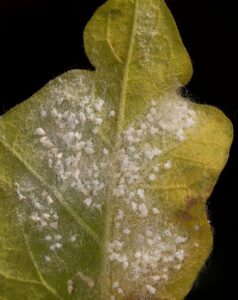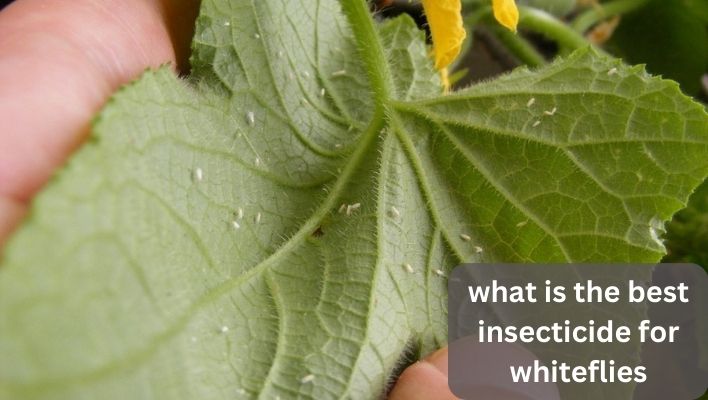Whiteflies are tiny, winged insects that feed on the sap of plants. They are notorious for causing significant damage to crops and ornamental plants and can be a major headache for gardeners and farmers alike. Whiteflies can cause stunted growth, yellowing of leaves, and even death of plants. Therefore, it’s important to control whiteflies to prevent damage and ensure the health of your plants.
One effective way to control whiteflies is by using insecticides. However, with so many options available, knowing which one to choose can take time and effort.
This article will explore the best insecticides for whiteflies, including their pros and cons, how to use them effectively, and other prevention and control methods. By the end of this article, you’ll be equipped with the knowledge you need to tackle whiteflies and keep your plants healthy.
Understanding Whiteflies
Whiteflies are small, winged insects that belong to the Aleyrodidae family. They are typically 1-3mm long and usually found on the undersides of leaves. There are several species of whiteflies, but they all share some common characteristics, such as a pale yellow or white color and a powdery appearance.
The life cycle of whiteflies consists of four stages: eggs, nymphs, pupae, and adults. Female whiteflies lay their eggs on the underside of leaves, and after hatching, the nymphs begin feeding on the sap of the plant. As they grow, they molt several times before developing into pupae. Eventually, the pupae emerge as adult whiteflies and start the cycle anew.
Whiteflies can cause significant damage to plants, especially when populations are high. They feed on the sap of plants, which can result in stunted growth, yellowing of leaves, premature leaf drop, and even death of the plant. Additionally, whiteflies can transmit plant viruses, further exacerbating plant damage. It’s important to monitor for whiteflies and take action to control their populations before they cause irreparable harm to your plants.

How to Identify Whiteflies
Identifying whiteflies can be challenging because they are small and easily go unnoticed. However, some symptoms can help you detect a whitefly infestation. These include:
- Yellowing leaves – Whiteflies feed on the sap of plants, which can cause leaves to turn yellow and wilted.
- Sticky residue – Whiteflies excrete a sugary substance called honeydew, making leaves appear shiny and sticky.
- Whitefly nymphs are tiny, pale-colored insects found on the undersides of leaves. They resemble small-scale insects or aphids.
- Whitefly adults – Adult whiteflies are small, moth-like insects with four wings covered in a white, powdery substance.
There are several species of whiteflies, but the most common ones include the greenhouse whitefly, silverleaf whitefly, and banded-winged whitefly. Different species of whiteflies can have slightly different appearances, behaviors, and preferences for plants. Identifying the specific species of whitefly can help you choose the most effective control methods.
Prevention and Control of Whiteflies
Several methods for preventing and controlling whiteflies include cultural, biological, and chemical control methods. Here are some of the most effective methods:
Cultural control methods: These methods involve practices that discourage whiteflies from infesting your plants. Some cultural control methods include:
-
- Pruning infected plant parts: Remove any leaves or branches that show signs of whitefly infestation to prevent the spread of the insects to other parts of the plant.
- Crop rotation: Planting different crops in the same area each year can help disrupt the life cycle of whiteflies and reduce their populations.
- Keep plants healthy: Healthy plants are less susceptible to whitefly infestations, so make sure your plants are properly watered, fertilized, and pruned.
Biological control: These methods involve using natural predators or parasites to control whitefly populations. Some biological control methods include:
-
- Ladybugs: Ladybugs are natural predators of whiteflies and can be released in your garden to control whitefly populations.
- Parasitic wasps: Some species lay their eggs in whitefly nymphs, eventually killing them.
Chemical control methods: These methods involve using insecticides to control whiteflies. Choosing an insecticide that is effective against whiteflies and safe for your plants is important. Some chemical control methods include:
-
- Neem oil: Neem oil is a natural insecticide that can be effective against whiteflies.
- Insecticidal soap: Insecticidal soap is a mild insecticide that can be effective against whiteflies.
- Pyrethrin: Pyrethrin is a chemical insecticide that can be effective against whiteflies but can also harm beneficial insects and pollinators.
Before using any insecticide, it’s important to consider several factors, such as the plant type, the infestation’s severity, and the potential harm to non-target organisms. Always follow the instructions on the label carefully and use insecticides only as directed.
Best Insecticides for Whiteflies
When choosing the best insecticide for whiteflies, consider the severity of the infestation, the type of plant, and the potential harm to non-target organisms. Systemic insecticides may provide longer-lasting control but can also harm beneficial insects and pollinators. Contact insecticides can provide immediate control but may require more frequent applications. Biological insecticides can be effective and safe but may require longer to take effect.
It’s important to carefully read the label and follow the instructions for any insecticide you use. Always wear protective clothing and equipment when applying insecticides, and avoid applying them during windy or rainy conditions.
BioAdvanced 3-in-1 Insect Disease and Mite Control
BioAdvanced 3-in-1 Insect Disease and Mite Control is a popular insecticide for controlling whiteflies. It contains neem oil, which is a natural insecticide that works by disrupting the feeding and reproductive systems of whiteflies. In addition to controlling whiteflies, it also controls other pests, such as mites and aphids, and helps prevent diseases like black spots and powdery mildew.
One of the benefits of using BioAdvanced 3-in-1 Insect Disease and Mite Control is that it is safe for use on a wide range of ornamental plants, vegetables, and fruit trees. It can be applied as a spray or through a hose-end sprayer, making it easy to apply and distribute evenly.
It’s important to read the label carefully before using BioAdvanced 3-in-1 Insect Disease and Mite Control, as it contains specific instructions on dosage, application methods, and safety precautions. As with any insecticide, following the recommended dosages and safety guidelines is important to avoid harming plants, people, or pets.
Safer Brand 5182-6 Neem Oil Concentrate Insecticide
Safer Brand 5182-6 Neem Oil Concentrate Insecticide is a highly effective insecticide for controlling whiteflies and other common garden pests. This insecticide is made from neem oil, derived from the seeds of the neem tree, and it works by disrupting the life cycle of whiteflies and other insects, preventing them from feeding and reproducing.
One of the advantages of Safer Brand 5182-6 Neem Oil Concentrate Insecticide is that it’s safe to use around humans, pets, and beneficial insects. It’s also versatile and can be used on various plants, including fruits and vegetables, ornamentals, and houseplants.
To use Safer Brand 5182-6 Neem Oil Concentrate Insecticide, you need to dilute the concentrate with water according to the instructions on the label. Once diluted, you can apply it to your plants using a sprayer. For best results, apply the insecticide early in the morning or late in the evening when the temperature is cooler, and whiteflies are less active.
General Hydroponics AzaMax, 4 fl. oz. Orange
Another effective insecticide for controlling whiteflies is General Hydroponics AzaMax, which contains azadirachtin, a natural compound found in neem oil. AzaMax works by disrupting the feeding and reproduction of whiteflies and other insects, eventually leading to their death.
One of the benefits of General Hydroponics AzaMax is that it’s safe to use on a wide range of plants, including fruits and vegetables, ornamentals, and houseplants. It’s also non-toxic to humans and pets, making it a popular choice among organic gardeners.
To use General Hydroponics AzaMax, dilute the concentrate with water according to the instructions on the label, and apply it to your plants using a sprayer. For best results, apply the insecticide early in the morning or late in the evening when the temperature is cooler, and whiteflies are less active.
Earth’s Ally Plant Care Bundle – Insecticide and Fungicide Spray
The Earth’s Ally Plant Care Bundle is a great option for those looking for a comprehensive solution to control whiteflies and fungal diseases. This bundle includes an insecticide and fungicide spray, making it a great all-in-one option for gardeners.
The insecticide spray contains spinosad, a naturally occurring bacterium that targets the nervous system of whiteflies and other insects, leading to their death. Meanwhile, the fungicide spray contains clarified hydrophobic extract of neem oil, which works by disrupting the growth and reproduction of fungi, ultimately preventing the spread of fungal diseases.
One of the benefits of the Earth’s Ally Plant Care Bundle is that it’s safe for use on a wide range of plants, including fruits and vegetables, ornamentals, and houseplants. It’s also non-toxic to humans and pets, making it a great choice for those looking for organic options.
To use the Earth’s Ally Plant Care Bundle, shake the sprays well and apply them directly to the foliage of your plants, covering both the top and bottom of the leaves. For best results, apply early in the morning or late in the evening when the temperature is cooler, and whiteflies are less active.
How to Use Insecticides for Whiteflies
When using insecticides to control whiteflies, it’s important to follow some basic dos and don’ts:
Dos:
- Read the label carefully before using any insecticide.
- Wear protective clothing and equipment, such as gloves, long-sleeved shirts, and respirators.
- Apply insecticides during calm, dry weather conditions.
- Apply insecticides to the underside of leaves, where whiteflies are most likely to be found.
- Use the recommended amount of insecticide for your plant and the severity of the infestation.
Don’ts:
- Apply insecticides during windy or rainy conditions.
- Apply insecticides to plants that are stressed or damaged.
- Apply insecticides near bodies of water, as they can harm aquatic organisms.
- Apply insecticides more frequently than recommended on the label.
Safety Precautions:
- Store insecticides in a cool, dry place, away from children and pets.
- Dispose of empty insecticide containers properly.
- Wash your hands and clothing thoroughly after using insecticides.
Proper Application Techniques:
- Use a sprayer or other applicator designed for insecticide use.
- Make sure the nozzle is set to produce a fine mist, which will help distribute the insecticide evenly.
- Spray the underside of the leaves, as this is where whiteflies are most likely to be found.
- Apply insecticides in the early morning or late afternoon when the temperature is cooler and whiteflies are less active.
By following these dos and don’ts, taking proper safety precautions, and using the correct application techniques, you can effectively control whiteflies using insecticides. However, it’s important also to consider alternative methods, such as cultural and biological control methods, to minimize the use of insecticides and reduce harm to non-target organisms.
Conclusion
Controlling whiteflies can be a challenging task for any gardener or farmer. However, by understanding the characteristics of whiteflies, identifying them early, and using the appropriate control methods, it’s possible to keep them under control and prevent them from causing significant damage to your plants.
Insecticides can effectively control whiteflies, but choosing the right insecticide and using it safely and responsibly is important. Some of the best insecticides for whiteflies include systemic, contact, and biological insecticides.
When using insecticides, following the dos and don’ts, taking safety precautions, and using the correct application techniques are important. However, it’s also important to consider alternative control methods, such as cultural and biological control methods, to minimize the use of insecticides and reduce harm to non-target organisms.
In conclusion, combining different control methods and taking a holistic approach to pest management can effectively control whiteflies and keep your plants healthy and thriving.




